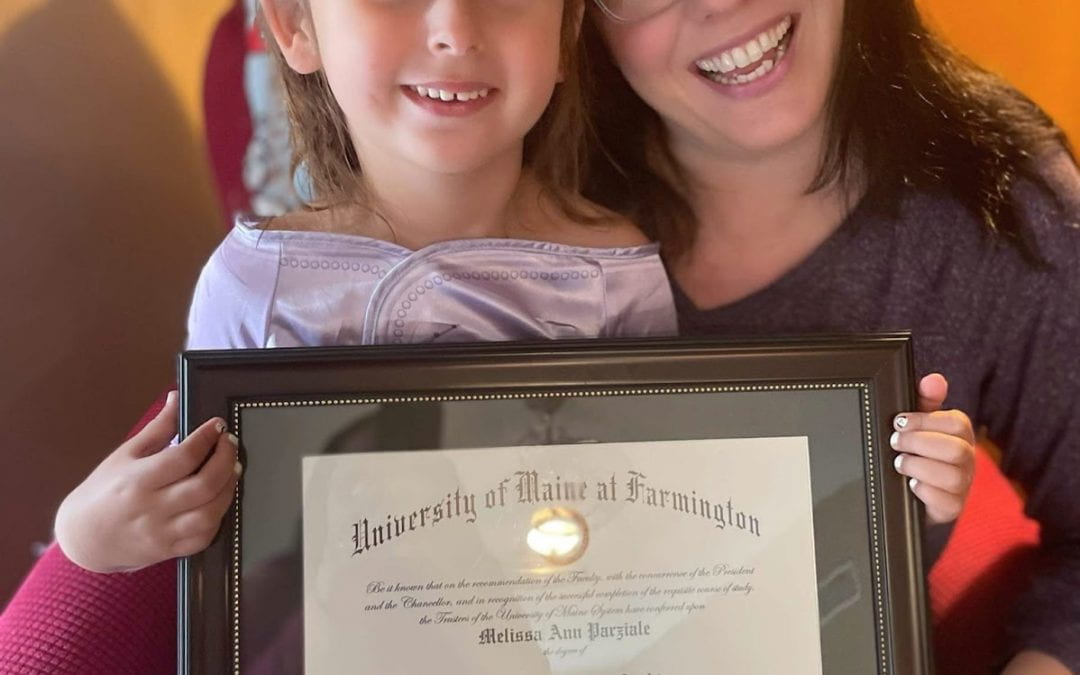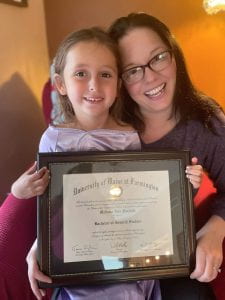Dec 16, 2021 | Exclusive, Feature, News |
By Ashley Ward, Secretary and Assistant Editor
FARMINGTON 一 Over the next two weeks students at UMF will submit their final assessments and projects, bringing the Fall 2021 semester to a close. Finals are often a high-stress part of the school year for students, as they require a significant amount of effort and are typically worth a larger portion of the student’s final grade for a class.
Stress affects well-being in all aspects and mental health is just as important as physical health. For some students, their first experience with an academic final is in college and stress levels can skyrocket as a result. Sophomores Grayson Koelbl and Katelyn Ryan impart advice for any frazzled first year students:
“Remember to prioritize your mental health. This is easier said than done, because there are times when I don’t follow this. But have faith in yourself and make sure to check in with yourself mentally from time to time. Don’t forget, water is your best friend. Screaming into a pillow helps too,” Koelbl said.
“My best tip would be to really organize your time. Try to make a little schedule for finals week and the week before, making note of when you’ll be studying for exams or working on final projects and papers, as well as when you’ll be taking some time for yourself,” Ryan said.
Oftentimes, increased stress is followed by a lack of sleep as students scramble to find the time for everything they need to get done. Getting less than six to seven hours of sleep a night is not ideal and can lead to further stress-induced complications. Budget time to allow for sleeping/waking up at the same times every day, especially during finals week.
There is a hard cut-off deadline for turning in Fall 2021 assignments on Thursday Dec. 16 at 3:00 p.m.. Assessments or projects turned in after this point are not supposed to be accepted, so it would help to keep that deadline in mind when organizing your time.
Dec 16, 2021 | Feature, News |
By Sophia Turgeon, contributing writer
UMF will be implementing a new curriculum and credit system in the fall of 2023; the Board of Trustees of the University of Maine System approved the campus to alter from a four-credit system to a three-credit system.
This system is one that many University of Maine System schools use, but it comes with a catch. Currently, full-time students take four classes a semester and earn a total of 16 credits (four credits per class). Beginning in September 2023, full-time students will need to take five classes to earn a total of 15 credits (three credits per class).
The overall intention of this change is to match UMF’s curriculum with other University of Maine System schools. This will allow UMF to begin increasing the amount of collaboration between other schools in the system. Additionally, it is also intended to make the transfer of students to UMF easier.
Provost and Vice Principal of Academic Affairs at UMF, Eric Brown, believes that students should not be too alarmed by this change. Program requirements will remain the same for students and the amount of credits needed to graduate will be decreased to accommodate this curriculum. With that being said, UMF faculty is currently reshaping their classes in order to account for the reduced amount of time spent in the classroom.
“No students should be adversely affected by this change in terms of program requirements or path to graduation,” Brown said. “And for many current students the change will likely mean a slightly lower cost for their UMF education, since they will only need 120 rather than 128 credits to graduate,” Brown said.
Brown also admitted that though this shift may be difficult, it will not be disastrous. “… there is time to adjust and anticipate what the changes will look like,” Brown said. “I was here at UMF when we shifted from 3-credits to 4-credits and the adjustment didn’t happen overnight. But at some point it will become a new normal.”
When it comes to students wishing to transfer to UMF, Brown trusts that this credit system will make the transition much smoother. According to Brown, more than half (55%) of the transfer students at UMF that were surveyed confessed that they had lost credits during their transition to UMF. Moreover, 45% reported being required to take more classes than they had initially planned.
“One of the primary reasons for making this change is actually to better align our curriculum with all of the other University of Maine System schools,” Brown said. “This will facilitate one of the System’s strategic goals in the coming years—more multicampus collaboration and more seamless movement for students between and among campuses. But what makes UMF special, in my experience—the close and authentic bonds between faculty and staff and students—will not change. And no one anytime soon will mistake Farmington for Portland or Presque Isle.”
When considering the kind of school UMF is, Brown believes that UMF has always been an amazing university for students to attend, even before the switch to a four-credit system. “UMF was a fantastic school before we switched to a 4-credit curriculum and will continue to be so once we have switched back to a 3-credit model,” Brown said. “It doesn’t mean the transition will be easy or always graceful but the core mission and values of this place will maintain. It really is a rare opportunity to reimagine our best practices collectively as an institution, and to continue to improve upon our well-established record of student success. And I do believe we can emerge stronger as a university once we are on the other side of the work to get us there.”

Dec 16, 2021 | Exclusive, Feature, News, TopStory |
By Charity Webster, contributing writer

(Photo Credit Melissa Pariziale) Melissa and her daughter Mia
Becoming an alumni is what every student wants, but often life throws curve balls at the student which changes the course of life and causes them not to complete the task. UMF has started an amazing opportunity for those students that have struggled to complete their degrees for one reason or another. A program called “Almost Alumni” helps these individuals finally finish their degrees.
Ashley Montgomery is the Assistant to the Dean, Learning and Assessment at UMF, and she is the driving force of Almost Alumni. She also chairs the academic success team which monitors and works with students who are struggling currently at UMF. These “Almost Alumni” individuals are having their transcripts reviewed. If it is possible to complete the degree they will support these individuals through the process.
In the beginning, when Montgomery was attending a meeting with others involved in upper-level education, she really had not put much thought into UMF having a large number of Almost Alumni or stop students (as they are called elsewhere). “Our numbers for adults (24+years old) is very minimal and the majority of the UMF population tends to be of a traditional age,” said Montgomery. Typically, more than half of a class finishes the degree in a normal college timeline. What happens to the rest of them? UMF has stepped up to find them and help support them through what is missing. They are committed to the success of the non-traditional student. They are even willing to pay fines and find resources to pay for books and other college expenses. “They will even research more local colleges for the student to make the transition and completion easier.” said Melissa Parziale, Graduate from Almost Alumni.
“Almost Alumni have delivered 20+ diplomas to students who never had the opportunity to finish their college degree over the last year, each time I was almost in tears from so much joy.” Montgomery said.
Montgomery has sifted through hundreds of past students and selected students that she is approaching to develop a plan to finish. When asked if there was financial support for these students, the answer was there are funds that can help Almost Alumni complete their projected course of study.
Melissa Parziale is one of those students who was approached by Montgomery and only needed two classes to graduate once they reviewed her transcripts and changed her major to General Education. “This phone call and opportunity came at the perfect moment in my life. During COVID, I had lost my job and I was training for Human Resource Management and Leadership, I was so shocked I was receiving an email saying I was close to finishing my Degree” said Parziale. Twenty-eight years after starting her degree at UMF, she finally finished her degree in July of 2021. She proudly hangs it on her wall in her office at a Dental Lab where she is the Director of Human Resources.
For some individuals, graduation is even easier than anticipated. “For some it might be just switching majors and immediately getting a diploma, and for others it might be just one class to completion” Montgomery said. There are a lot of students in the system who have a degree right now and don’t even know it, some just because they never applied for their diploma. Also, they may have been enrolled in the program a while back and the requirements have changed. “These are the easy diplomas,” said Montgomery.
“If I could tell everyone to go back and finish I would, it was what I always wanted to do and Ashley supported me through it every step of the way. Reach out to her and finish,” said Parziale. “I wanted my daughter to know that she can do anything and to never give up on your dreams.”
Contact Information: Almost Alumni Ashley Montgomery Assistant to the Dean, Learning and Assessment at UMF ashleym@maine.edu
Sep 26, 2019 | News |
Kaitlynn Tarbox, Contributing Writer
UMF’s student employees have proven to be an integral part of campus life and functions as they maintain a variety of positions on campus such as giving tours, delivering mail and secretarial positions. Without them, work loads on staff would increase significantly.
Joseph Toner, Assistant Director of Financial Aid said in an email interview, “Student employees make our campus go. In just about any corner of campus you will find student employees whose work is not only vital to campus operations, but who are building their resumes through experiential work and hands on training.”
Student success is one of the most important things to Toner. “Not only would the day to day operations suffer greatly without student workers, but more importantly, there would be a noticeable difference in overall student success at UMF,” he said. “Student employment is one of the main success indicators for students here; meaning, those who choose to work on campus persist at a higher rate, do better academically, and are more socially engaged.”
Student employees are often the first to greet upcoming students whether it be through a tour or open houses. By welcoming these new students, employees create a student’s first impression of UMF. During the application and tour process Toner said that “as [new students] begin to dig deeper and learn more about UMF they will see student employees at every step along the way. Whether our student employees know it or not, they are all equally important to the success of UMF and the Farmington community.”
Andrea Butterfield, Mail Services Assistant in the mailroom said that “student workers are very important, our department is very dependent on them for things to run smoothly.”
The mail room offers 20 work study positions and usually fills 18 of those. Currently they have 11 employees and without them Butterfield said, “ A lot would not get done, I would be the only employee in the mailroom and mail would no longer be delivered to the residence halls or departments. They would have to come pick up their mail at the mailroom.”
The mailroom struggled during the first few weeks of the semester with a system glitch and lack of employees. In difficult situations, like the large amount of packages that needed to be checked in after their computer system glitched, Butterfield said, “I’m grateful for [the student workers] everyday.”
Lilly Spencer, a sophomore who receives work-study, said, “If we didn’t have student workers a lot of people probably would not be able to attend college. College is really expensive and having a way that we can work towards our tuition is really empowering and beneficial.”
There are many benefits to working on campus: career readiness, time management skills, networking, creating positive relationships with others and other skills that vary on the employee’s position.
Quinlan Boyle, sophomore, worked for the mailroom last year. “I am thankful for student workers every time I get my mail, eat in the dining hall or have a technology problem,” he said.
Without student workers filling over 700 employee positions much of campus life would come to a standstill. Boyle said, “It would not be great without student workers, there is a lot going on at UMF all the time, people who give tours, deliver mail, work in food service. There would be a lot that would not get done due to the lack of student workers.”

Dec 8, 2017 | News |
By Gavin Elliot, Contributing Writer
“I’ve always have been interested in serving my country, but I’m not a military person. So I knew if I wanted to, I had to find a way without carrying a gun around,” said Danny Marshall as he leaned forward.
Marshall, originally from Auburn, Maine, will be graduating from UMF in 2018 with a degree in Philosophy and Religion. Just a few weeks later, he will be flying to Mongolia to co-teach English in the Peace Corps. The process of him applying to the Peace Corps started in the Spring semester of 2017. After talking to a Peace Corps representative, he decided to fill out the “send me anywhere” application.

Philosophy and Religion major Danny Marshall (Photo Courtesy of Danny Marshall)
“When I told my family that I had started the application process, they thought it was unlike me at first,” said Marshall. “But, I questioned my maturity and I felt the need to actively seek out responsibility.”
Like many others in college, Marshall undergoes many adulthood norms, but still doesn’t always feel like one. “Even though I pay rent, have a job and go to school full-time I don’t really feel like an adult,” said Marshall.
He also saw the Peace Corps as an opportunity to travel and immerse himself in another culture. “I’ve always wanted to travel, but I don’t want to be a tourist. I want to be a part of the community. I don’t like the idea of just going to some place, taking pictures and doing touristy things like buying a t-shirt,” he said chuckling.
After Marshall received confirmation that he was accepted into the Peace Corps and traveling to Mongolia, his family’s mood changed. “When I told them I was going to Mongolia, they were happy,” he said.
Setting his sights to his move in May, Marshall is unsure of what it will be like without running water, electricity, and other commodities. “I’d be lying if I didn’t say I wasn’t worried about how I will adjust to new living conditions, let alone a complete new country. I believe that I will do pretty well for myself,” said Marshall with a smile. “I don’t think it will be hard to take what I have learned from my Philosophy teachers and apply it over there.”
However, he knows that what he’s learned in his time here at UMF won’t be quite enough. “This is my last semester. So, during the spring semester, I will be doing as much research about the Mongolian language and traditions I can, while dealing with nerves and excitement,” said Marshall. “I’ll be the most nervous while anticipating my flight. The combination of it being my first flight and a big change will probably be the worst. But until then, I will have to try to relax and get some sleep.”


